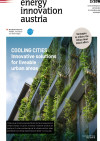Publications
There are 686 results.
Documentary on 3sat "The future of living"

Production of a 45 minutes film about living in the future.
Facade Integrated Solar Collectors

Within the framework of this project system-, structural- as well as building physical basis theories should be elaborated, which will serve as a basis for constructional and aesthetically attractive solutions for the production of facade integrated solar collectors without thermal separation. The recyclability of the materials used and resource efficiency play a central role when it comes to the development of constructional solutions.
Solar Combisystems - IEA SHC Task 26

Documentation, comparison and optimisation of solar combisystems for domestic hot water preparation and space heating in the framework of an IEA research project
European Smart City Initiative - Assessment of Best Practices to StimulateMarket-/Demand-Pull

This study analyses endeavours of several European cities of becoming Smart Cities. The Kyoto Protocol from 2002 as well as the participation in different energy initiatives play a crucial role. The comparison of the results from the different cities shows that Austria has to become more ambitioned and thorough in the realm of its Smart City strategies. The study delivers valuable contributions, examples and motivations.
NAMA Guidelines for Land-Use and Bioenergy (2010)

The land use and bioenergy sectors from an integrated system. This system has features that are likely to require approaches distinct from those suitable for other sectors. Thus, although a general framework for NAMAs has been developed, requirements appropriate to specific sectors are needed.
Multilingual
Bioenergy: Counting on Incentives (2010)

Response to the paper by D. Searchinger et. al., Letters to Science. 327 (2010), 1199 - 1200.
Pingoud K., Cowie A., Bird N., Gustavsson L., Rüter S., Sathre R., Soimakallio S., Türk A., Woess-Gallasch S.
English
Innovative Refurbishment of Single Family Houses

Evaluation of best-practice models and recommendations to support dissemination
Cooling Citites

Innovative solutions for liveable urban areas
energy innovation austria
2/2019
Publisher: BMVIT und Klima- und Energiefonds
English, 12 pages
Publication Downloads
homeVALUE

The ecology and economy of housing. An assessment system for the evaluation of the suitability of buildings and housing estates for the future.
Linking Low Carbon Technologies with Low Carbon Society

The project „Linking Low Carbon Technologies with Low Carbon Society“ was conducted on behalf of the Federal Ministry of Transport, Innovation and Technology. In the course of the project a number of recent empirical studies on rebound effects were analysed. Based on this comprehensive analysis an overview of strategies for rebound management was compiled and policy recommendations for the technology sector were developed.
Technology and Innovation Roadmap "BioHeating and Cooling"

The Roadmap links with the energy research strategy of the Austrian Council for Research. It was developped together with national stakeholders from industry to deduct recommendations for policy makers. It includes clear suggestions for research topics until 2020 and provides an outlook on the contribution of biomass to the heating sector of a decarbonised energy system in 2050.
Solar energy - a significant economic factor

Major goals of this study were determination of the number of jobs provided in the thermal solar energy sector, the added economic value created in this sector and the predicted effects of achieving the goals, in order to better evaluate the economic significance of the use of thermal solar energy.
Sanierung PRO!

The goal of the project is the development of a guideline, which supports builders and planners or consultants in the organization and monitoring of inhabitant integration into the reorganization processes of multi-storey housing.
home dreams

Listening to the inhabitants of innovative buildings and using their satisfactory and unsatisfactory experiences as the basis for drawing up practice based criteria and recommendations for a quality, user-orientated building policy. The target groups are funding bodies, building contractors and town planners.
Cooperative Refurbishment

Models for participation of owners and tenants in ecological refurbishment of multi floor buildings
Ecological Passive houses

Discussion of transfer of know how for ecological passivehouses, networking (national and international)
Energy-efficient army barracks

Holistic sanitation concepts for three selected army barracks belonging to the Austrian armed forces to achieve the standard of a low-energy house. An increase in energy efficiency and corresponding models for implementation agreed with large-volume buildings with due consideration to the special conditions prevalent within the Austrian armed forces.
Binderfree Cellulose Compounds

Optimisation of weatherproof-performance (UV-protection and water-tightness) of binderfree cellulose compounds (incl. life cycle optimisation)
EXPO HdZ: Best of Diffusion

Conception and implementation of measures to spread selected results from the house of the future - program to the building industry, in particular to meet the target groups architects, builders and building developers.
